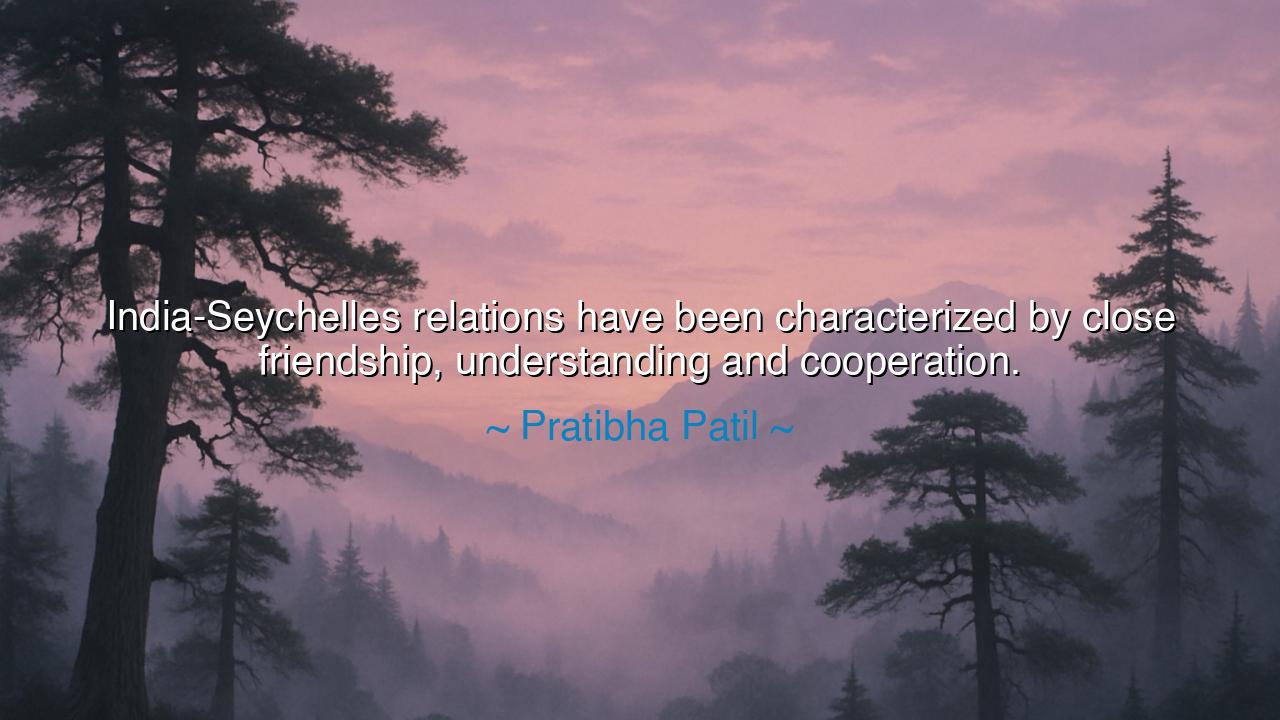
India-Seychelles relations have been characterized by close
India-Seychelles relations have been characterized by close friendship, understanding and cooperation.






In the grand tapestry of human history, there are relationships between nations that transcend the fleeting moments of conflict and division. Instead, these bonds are forged in the fires of understanding, friendship, and cooperation. Pratibha Patil, in her reflection on the relationship between India and Seychelles, speaks of such a bond when she states: "The India-Seychelles relations have been characterized by close friendship, understanding, and cooperation." These words resonate with a timeless truth: that the strongest and most enduring alliances are those rooted in mutual respect, shared goals, and a genuine desire to grow together in a spirit of unity.
The ancients understood this deeply. The great city-states of Greece, for example, often formed alliances not just based on military or economic interests, but on a shared cultural identity and a mutual respect for one another’s sovereignty. Take the Delian League, a collection of city-states formed to defend against the Persian Empire. While they may have been separated by differences in government or values, their friendship was based on a shared goal—the preservation of their freedom and independence. Similarly, the bond between India and Seychelles goes beyond mere political or economic interests; it is a relationship built on understanding and the recognition that they share a common destiny in the broader community of nations.
The relationship between India and Seychelles is not one of dominance or submission but of mutual cooperation—a partnership where both sides understand that they thrive when they work together. This is a bond that transcends borders, a reminder that even small island nations like Seychelles, with its limited resources, can build meaningful, strong alliances with great powers like India. The ancient Greeks often spoke of the importance of alliance—a word that means not just a military pact, but a shared vision and the coming together of peoples with similar values. The relationship between India and Seychelles serves as a modern-day reflection of this ancient ideal, where cooperation is not born from need but from a genuine desire to uplift each other.
Consider, for example, the bond between Rome and its allies during its rise to power. While Rome often played the role of the dominant power in these relationships, it also understood the importance of mutual respect and understanding. The Roman Republic thrived not only because of its military might but because it forged alliances based on the welfare and independence of its allies. The island nations of the Mediterranean, while often small and defenseless on their own, found strength in these alliances. Similarly, India and Seychelles may be separated by vast distances, but their relationship, based on shared values and goals, mirrors the timeless understanding that true alliances are built not just on common interests but on a deep sense of mutual respect.
Patil’s statement about India-Seychelles relations carries an important lesson: that nations, much like individuals, are at their strongest when they form relationships based on more than just mutual benefit. While economic and strategic considerations often shape the foundation of international relations, the friendship and understanding between nations add a layer of depth that strengthens those bonds and allows them to weather the storms of time. India and Seychelles have cultivated a relationship not based on hierarchy, but on partnership—a partnership where both nations recognize each other’s sovereignty, dignity, and importance on the global stage.
The lesson to be drawn from India-Seychelles relations is one of profound wisdom: cooperation is not a sign of weakness or submission, but a strength that comes from the recognition that, in this interconnected world, no nation thrives in isolation. Whether through trade, diplomacy, or cultural exchange, true alliances are those where nations work together for the common good, for the welfare of all involved. In our personal lives, we must seek to build relationships based not on self-interest alone, but on understanding and the desire to uplift one another. The greatest bonds are forged not in competition, but in cooperation and respect.
As we navigate our own relationships, whether personal or professional, let us remember the lesson of India and Seychelles: that true friendship and cooperation are not just beneficial, but essential to long-term success. Let us look beyond our immediate self-interests and see the larger picture—the strength that comes from working together, from recognizing the human dignity and sovereignty of those around us. The example set by these nations, whose bonds are rooted in shared values and goals, calls us to rise above the pettiness of division and embrace the true power of collaboration. Friendship and understanding, built on the foundation of respect, are what will carry us forward, individually and as a collective society, toward a future of prosperity and peace.






AAdministratorAdministrator
Welcome, honored guests. Please leave a comment, we will respond soon